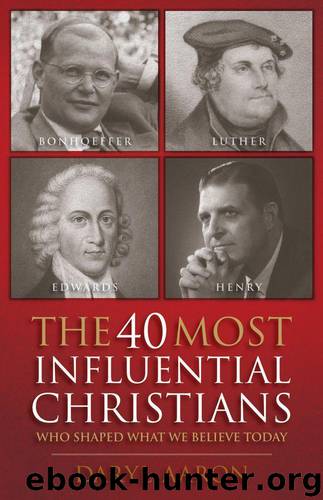The 40 Most Influential Christians . . . Who Shaped What We Believe Today by Daryl Aaron

Author:Daryl Aaron
Language: eng
Format: mobi
Tags: Christian Life, General, Religion, Inspirational, Church History, Christianity, Christians, History
ISBN: 9781441261564
Publisher: Baker Books
Published: 2013-08-01T00:00:00+00:00
Therefore, salvation can only come through the gracious work of God—sola gratia—received by faith—sola fide—based on the sacrificial work of Christ on the sinner’s behalf—solus Christus. This is none other than Augustinian/Lutheran monergism, which brings us to what was sometimes thought to be the center of Calvin’s thought and Calvinism in general—the doctrine of predestination.
Calvin does indeed have a strong view of divine predestination (he preferred the term election), but it is in reality a reflection of predecessors such as Augustine, quite a few medieval theologians, Luther, Zwingli, and most other reformers. Like them, Calvin had a high view of the sovereignty (he preferred the term providence) of God over everything—meticulous providence. Nothing happens apart from his sovereign will, and therefore a strong view of divine predestination necessarily follows. But predestination was not the central doctrine for Calvin. He doesn’t even deal with it until about two-thirds of the way through the final edition of his Institutes (3.21 ff.), and then under the heading “God the Redeemer in Christ” (2) and the application of that redemption to us (3). What was the central doctrine for Calvin? It was justification, which he says “is the main hinge on which religion turns” (Institutes, 3.11.1). Calvin does indeed emphasize God’s sovereignty and predestination, but primarily in connection with salvation, that is, as reflections of God’s goodness and love. And being the pastor that he was, especially to people who were being persecuted for their faith, Calvin stressed that divine sovereignty and predestination should help the believer trust God, especially in difficult circumstances, as well as find great comfort and hope in those difficult times. It should also produce appropriate humility before such an awesome God: “How much the ignorance of this principle [election, specifically] detracts from God’s glory, how much it takes away from true humility, is well known” (Institutes, 3.21.1).
Calvin was explicit that Christ’s sacrificial work was a substitution that actually took the punishment for sin in the place of the sinner, somewhat in contrast to Anselm’s idea of Christ’s death as satisfaction, displacing the need for punishment. Calvin wrote, “Hence, when Christ is hanged upon the cross, he makes himself subject to the curse [of the law]. It had to happen this way in order that the whole curse—which on account of our sins awaited us, or rather lay upon us—might be lifted from us, while it was transferred to him” (Institutes, 2.16.6). This is clearly an objective view of the atonement,[113] but for Calvin this did not exclude a subjective aspect. Through God’s work in salvation we are united with Christ (an important emphasis in Calvin’s theology) through the work of the Holy Spirit (also important to Calvin), and though in one sense things stay the same, in another sense things profoundly change: “We experience such participation in [Christ] that, although . . . we are sinners, he is our righteousness; while we are unclean, he is our purity; while we are weak, while we are unarmed and exposed to Satan, yet ours is that power which has been given him in heaven and on earth .
Download
This site does not store any files on its server. We only index and link to content provided by other sites. Please contact the content providers to delete copyright contents if any and email us, we'll remove relevant links or contents immediately.
| Buddhism | Christianity |
| Ethnic & Tribal | General |
| Hinduism | Islam |
| Judaism | New Age, Mythology & Occult |
| Religion, Politics & State |
Cecilia; Or, Memoirs of an Heiress — Volume 1 by Fanny Burney(31341)
Cecilia; Or, Memoirs of an Heiress — Volume 3 by Fanny Burney(30938)
Cecilia; Or, Memoirs of an Heiress — Volume 2 by Fanny Burney(30896)
The Secret History by Donna Tartt(16643)
Sapiens: A Brief History of Humankind by Yuval Noah Harari(13067)
Leonardo da Vinci by Walter Isaacson(11912)
The Radium Girls by Kate Moore(10914)
Sapiens by Yuval Noah Harari(4546)
The Wind in My Hair by Masih Alinejad(4427)
How Democracies Die by Steven Levitsky & Daniel Ziblatt(4407)
Homo Deus: A Brief History of Tomorrow by Yuval Noah Harari(4287)
Endurance: Shackleton's Incredible Voyage by Alfred Lansing(3852)
The Silk Roads by Peter Frankopan(3769)
Man's Search for Meaning by Viktor Frankl(3644)
Millionaire: The Philanderer, Gambler, and Duelist Who Invented Modern Finance by Janet Gleeson(3574)
The Rape of Nanking by Iris Chang(3522)
Hitler in Los Angeles by Steven J. Ross(3443)
The Motorcycle Diaries by Ernesto Che Guevara(3340)
Joan of Arc by Mary Gordon(3262)
